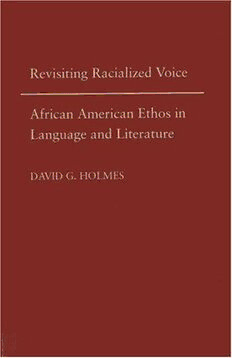
Revisiting Racialized Voice: African American Ethos in Language and Literature PDF
145 Pages·2004·0.415 MB·
Most books are stored in the elastic cloud where traffic is expensive. For this reason, we have a limit on daily download.
Preview Revisiting Racialized Voice: African American Ethos in Language and Literature
Description:
Revisiting Racialized Voice: African American Ethos in Language and Literature argues that past misconceptions about what constitutes black identity and voice, codified from the 1870s through the 1920s, inform contemporary assumptions about African American authorship. Tracing elements of racial consciousness in the works of Frederick Douglass, Charles Chesnutt, W.E.B. DuBois, Zora Neale Hurston, and others, David G. Holmes urges a revisiting of narratives from this period to strengthen and advance notions about racialized writing and to shape contemporary composition pedagogies. Holmes considers how the white hegemony demarcated black identity and reveals the ways some African American writers unintentionally reinforced the hegemony’s triad of race, language, and identity. Whereas some of these writers were able to help rethink black voice by recognizing dialect as a necessary linguistic discursive medium, others actually inhibited their own efforts to transcend race essentialism. Still others projected race as a personal and social paradox which complicated racial identity but did not denigrate African American identity. In recalling the transition in the 1960s from voice as metaphor denoting literary authorship to one connoting student authorship, Holmes posits that rereading the 1960s would enable a mediation between literary and rhetorical voice and an empowered look at race as both an abstraction and as rhetorically indispensable. Pointing to the intersection of African American identity, literature, and rhetoric, Revisiting Racialized Voice begins to construct rhetorically workable yet ideologically flexible definitions of black voice. Holmes maintains that political pressure to embrace a “color blindness” endangers scholars’ ability to uncover links between racialized discourses of the past and the present, and he calls instead for a reassessment of the material realities and theoretical assumptions race represents and with which it has been associated.
See more
The list of books you might like
Most books are stored in the elastic cloud where traffic is expensive. For this reason, we have a limit on daily download.
